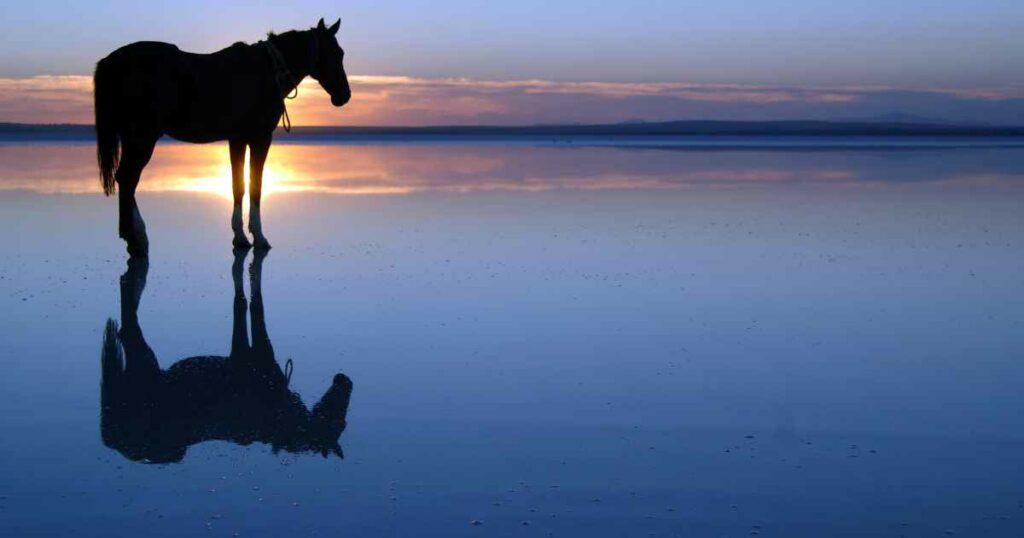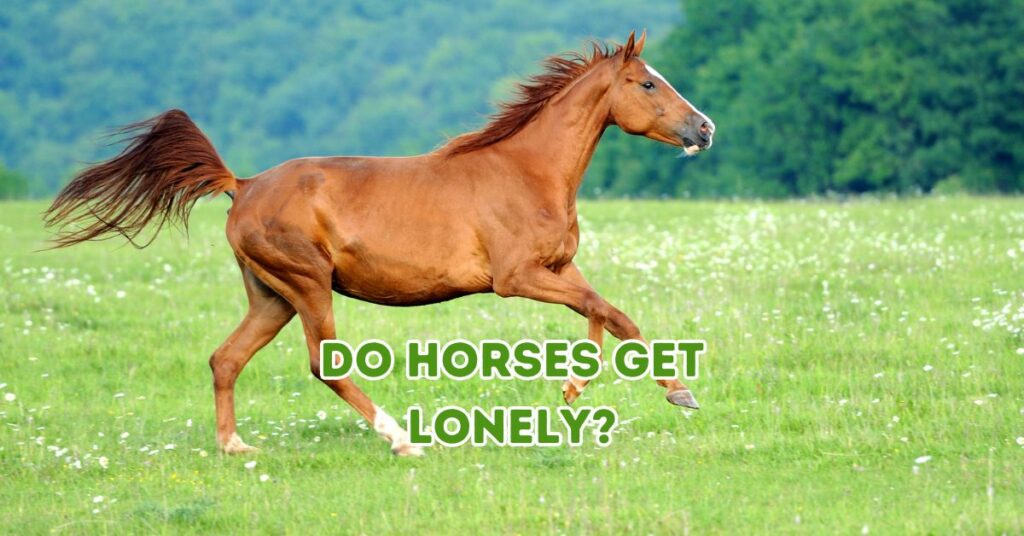As an Amazon Associate we earn from qualifying purchases.
Horses are naturally social creatures, and they have a deep need for companionship and herd behaviour. But do horses get lonely? And what effect can it have on their well-being? In this article, we will examine the science behind horse behaviour and explore what owners can do to prevent loneliness in their horses. Read on to learn more about how loneliness can affect horses, and what you can do to ensure your horse has the companionship it needs.
What Is Loneliness?
Loneliness is defined as a feeling of social isolation and a lack of companionship. It can be a difficult emotion to measure in animals, but studies have shown that it can have a profound effect on their behaviour and well-being. Animals that experience loneliness may become withdrawn, lethargic, and may even struggle to interact with other animals. They may also develop physical health problems due to stress and lack of stimulation.
SEE ALSO : Clydesdale vs Regular Horse – Which Is Best For Me?
Do Horses Get Lonely?
Yes, horses can experience loneliness. Studies have shown that horses separated from their herd for extended periods of time can show signs of distress and anxiety.
A study conducted by Nottingham Trent University found that horses that were stabled alone for extended periods of time showed increased levels of stress and anxiety. The study also found that horses that had access to a herd were less stressed and more likely to interact with others. This suggests that providing access to a herd can help to reduce the effects of loneliness in horses. To learn more about this study follow this link.
Signs Of Loneliness In Horses
If a horse displays signs of loneliness, it is important to address the issue as soon as possible. Below are 3 of the most common signs of loneliness in horses.
Decreased Appetite
One of the earliest signs of loneliness in horses is a decreased appetite. Horses may start to lose interest in their food, and may even start to show signs of depression. If a horse is not getting the social interaction they need, they may become listless and lethargic, and may even lay down and refuse to get up.
Horse Becoming Anxious
Horses may also become anxious and agitated when they are lonely. They may pace around their enclosure or stall and may become increasingly difficult to handle. This can be dangerous for both the horse and their handler and should be addressed promptly.
Destructive Behaviour
Horses may also start to engage in destructive behaviors if they are not given the proper amount of social interaction. Horses may start to chew on wood, kick their stall walls, or start to bite or kick other horses. These behaviors can be dangerous and should be addressed immediately.
Effects Of Loneliness In Horses

Horses are social animals that form strong bonds with their herd mates and thrive on companionship. When horses are isolated from the herd for extended periods of time, it can have serious psychological and physical effects on their well-being. From boredom to depression to physical ailments, loneliness can cause a variety of problems in horses.
Depression
When horses are isolated from their herd, they may become bored, anxious, and frustrated. This can lead to depression, which can be seen in horses as a loss of appetite, lethargy, and lack of interest in their environment. Horses may also become more aggressive or develop destructive behaviors such as wood chewing or cribbing.
Do Horses Get Depression?
Yes, horses can experience depression just like any other animal. Horses can become depressed for a variety of reasons, such as a change in routine, a lack of companionship, or an injury. Signs of depression in horses may include changes in behavior, such as reduced energy, apathy, or withdrawal. They may also show physical signs, such as difficulty sleeping, changes in appetite, or poor coat condition. If you suspect your horse is depressed, it’s important to seek veterinary advice. Your veterinarian can help diagnose the underlying cause and provide treatment, which may include dietary modifications, medication, or environmental enrichment.
Physical Problems
Physical problems can also result from long-term loneliness in horses. Horses living in solitary confinement may develop muscle atrophy due to lack of exercise. They may also become overweight due to over-eating, as they no longer have to compete for food.
Stress Related Problems
Loneliness can also lead to health problems in horses due to the stress it causes. Stress increases the likelihood of ulcers, colic, and other digestive problems. It can also weaken their immune system, making them more susceptible to illness and disease.
Negative Impact On Horses Social Skills
Loneliness can also have a negative impact on the horse’s social skills. Horses that are deprived of social interaction for extended periods of time may have difficulty forming relationships with other horses. They may also become more aggressive or shy around people, making it difficult to handle them.
How To Prevent Your Horses Getting Lonely
Loneliness in horses can be caused by a number of factors, including isolation from other horses, lack of exercise, and poor nutrition. Luckily, there are a few steps you can take to help prevent loneliness in horses.
Provide a Companion
Having a companion is one of the most important things you can do to prevent loneliness in your horse. Horses are herd animals and rearing them with a companion can help reduce their feelings of loneliness and isolation. Horses need to interact with other horses, both for physical and emotional wellbeing. If possible, try to keep a pair of horses together as this will give them the opportunity to interact with each other. If you do not have the resources to keep two horses, consider finding a companion for your horse by joining a riding club or taking your horse to an equestrian center.
Spend Time With Your Horse
Horses will always benefit from your presence and interaction. Spend time with your horse on a daily basis, grooming, playing, and exercising them. This will not only provide your horse with physical exercise, but it will also give them the mental stimulation they need. Make sure you provide positive reinforcement with verbal praise and treats to increase the bond between you and your horse.
Provide Enrichment
Enrichment activities are a great way to keep your horse entertained and prevent boredom. Provide your horse with toys, such as balls and ropes, and puzzles to keep them occupied. You can also try providing your horse with challenging tasks, such as obstacle courses, to keep their minds active.
Change Up Routines
Changing up routines can help prevent boredom and help your horse stay healthy. Incorporate different activities into your horse’s day, such as riding, long lining, and liberty work. Vary your horse’s environment by taking them for walks in the woods or to a different paddock.
Monitor Your Horse
Monitor your horse’s behavior to ensure that they are not becoming lonely or isolated. Pay attention to changes in their behavior, such as depression or aggression, and take action to resolve any issues.
By taking the time to provide companionship and enrichment for your horse, you can ensure that they do not become lonely or isolated. Horses are intelligent and social animals, and providing them with the companionship they need can help keep them healthy and happy.
Do Horses Get Bored?
Horses can certainly get bored. Just like any other animal, horses need mental stimulation, exercise, and socialization in order to remain interested and engaged in their environment. When horses lack these things, they become bored and may exhibit behaviors like pacing, cribbing, or weaving. Providing a variety of activities, such as ground work, training, turnout, and turnout with friends, can help keep horses engaged and prevent boredom. Additionally, providing a horse with a companion, such as another horse or a goat, can help combat boredom.
Do Horses Get Lonely – Final Thoughts
In conclusion, horses are social animals and need companionship and interaction to prevent loneliness. Taking steps to provide your horse with a companion, spending time with them, providing enrichment, changing up routines, and monitoring their behavior can help ensure that they do not become lonely. Horses are intelligent creatures and providing them with the companionship they need to stay happy and healthy is an important part of horse care.
Amazon and the Amazon logo are trademarks of Amazon.com, Inc, or its affiliates.

Hey there, I’m Jasmine! I’m a total horse fanatic and have been working with these amazing animals for as long as I can remember. I’m passionate about sharing my love for horses with others and helping them learn more about these majestic creatures. As a professional horse trainer and riding instructor, I’ve developed a deep understanding of equine science and am committed to the welfare of horses. That’s why I founded OwnTheHorse.com, a blog where I share my knowledge and insights with fellow horse enthusiasts. I love connecting with my readers and building a friendly community of horse lovers. Whether you’re a seasoned equestrian or just starting out, I’m here to help and inspire you. Above all, I’m a friendly and compassionate person who truly cares about the well-being of horses and their human companions.

